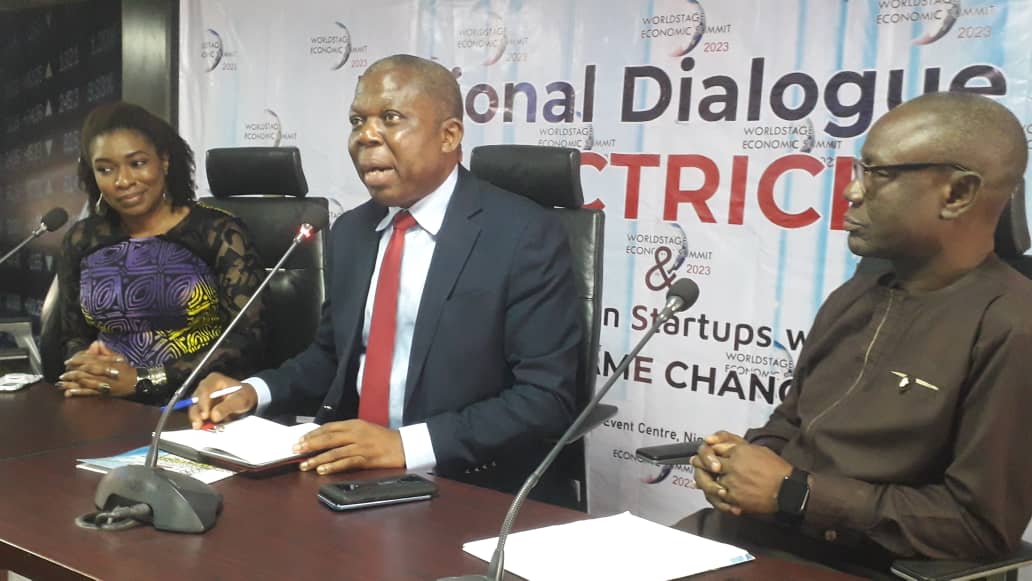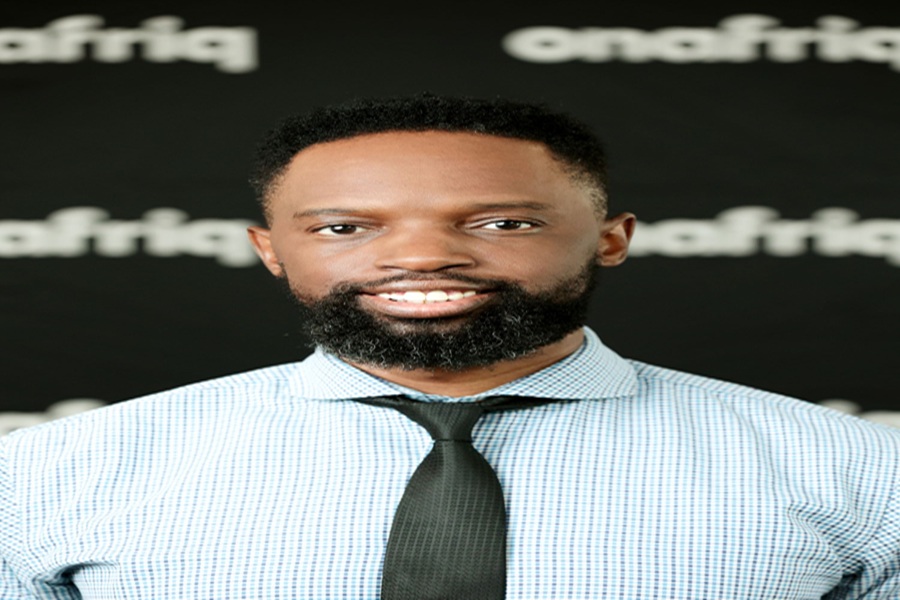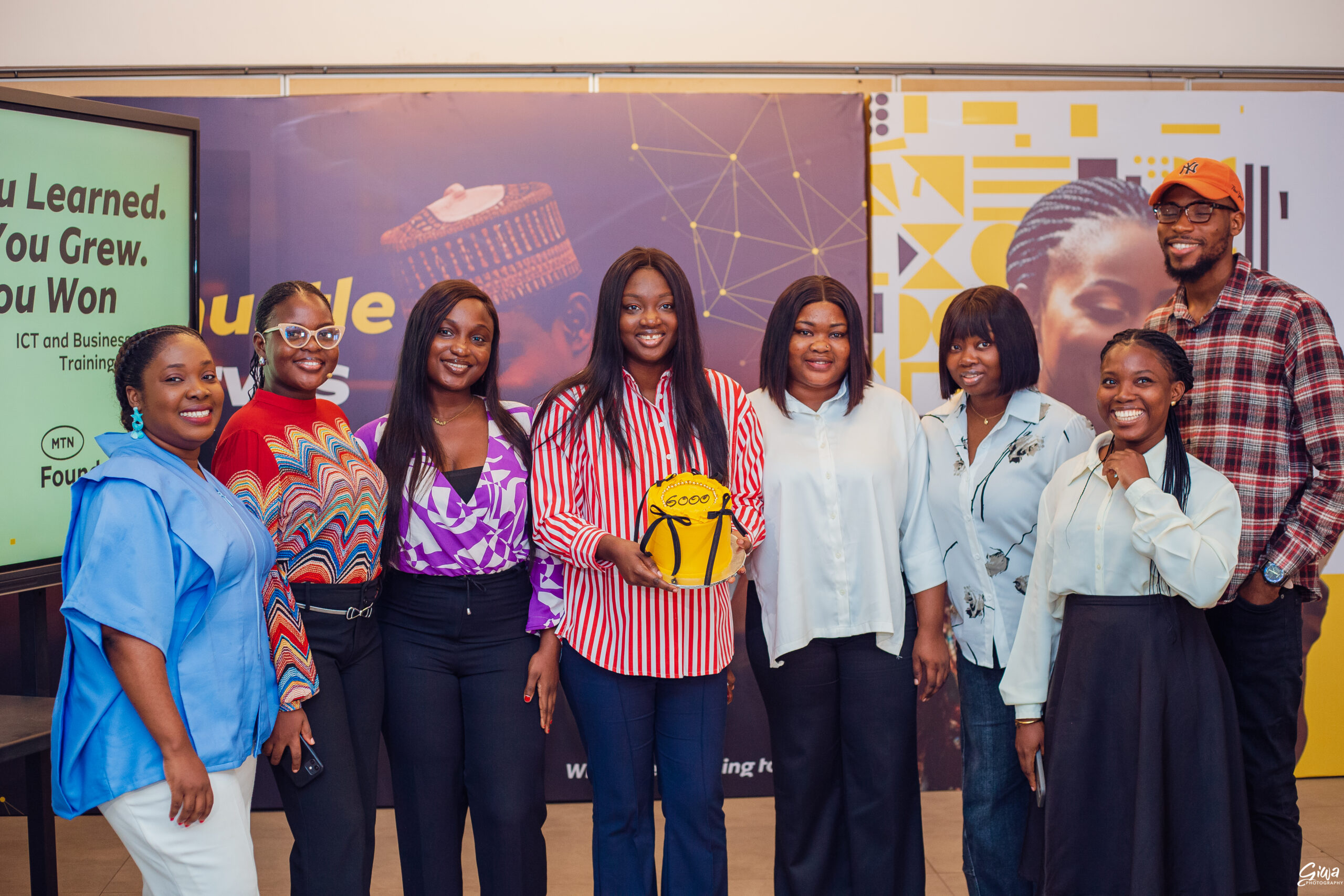Telecom
Stakeholders Brainstorm on Success Strategies for Startups @2023 WorldStage Economic Summit

Pioneer and successful players in startup businesses have unanimously advised that success could only come in the way of upcoming entrepreneurs through passion and perseverance rather than the desire to get rich quick.

L-R Mrs. Adekunbi Ademiluyi, MD, HumanManager Limited representing Mr. John Tani Obaro, Group Managing Director, SystemSpecs Holdings, Nigeria; Mr. Tim Akano, CEO, New Horizons Nigeria; and Mr. Mayowa Oludare, Editor-in-Chief of Global Financial Digest during panel discussion at the breakout session on WES 2023 tagged The Game Changers on Thursday, November 16, 2023 at the event centre , Nigerian Exchange, Lagos.
They gave the advice on Thursday at the breakout session on the WorldStage Economic Summit 2023 held at the event centre of the Nigerian Exchange, Lagos themed “The Game Changer.”
Moderated by the Editor-in-Chief of Global Financial Digest, Mr. Mayowa Oludare, guest speakers that took turns to share their experiences and address issues that were critical factors in understanding and running startup businesses to succeed were Mr. Tim Akano, CEO, New Horizons Nigeria; and Mrs. Adekunbi Ademiluyi, Managing Director, HumanManager Limited who represented the Group Managing Director of SystemSpecs Holdings, Nigeria, Mr. John Tani Obaro.
Giving a presentation on startups as the game changer, Mr. Akano admitted that it was always tough at the beginning but that passion and perseverance would make starters to overcome any challenge that might come their way in the build-up stages.
Reliving personal experience, he said it took him over 12 months to convince Nigerians about his startup which he started about 20 years ago after resigning from lucrative jobs with Coca Cola and Dunlop.
According to Akano, it takes perseverance to overcome challenges and it’s not a bed of roses to scale various hurdles for anyone ambitious to venture into startups. But every startup entrepreneur must have it at the back of their minds that the reward for solving problems is money and therefore make problem solving their focus if they desire to make headway, he stated.
Sounding out would-be startup entrepreneurs against failure, he warned against partnering with wrong people and to cut off with negative individuals who were only good at seeing challenges but not solutions.
“Don’t make a company of negative people, particularly the learned and academic who are fond of analysis to paralysis, only rolling out problems rather than solutions,” he warned.
He also advised upcoming startups that there is nothing bad in sharing ideas with people who may not be experts to avoid discouragement by people of much knowledge.
Asked if it’s advisable to engage partners from the start, he replied that it might be difficult to build a company with just one brain.
“The fear is understandable, but there’s no straight answer to it,” he said.
He however reminded the audience that Google was a product of some students and professors and that therefore it might not be a bad idea to have partners who are like-minded from the beginning.
He advised the youth not to be dominated by fear of the risk of bringing in people to co-own startup businesses.
Speaking on the benefits of mentoring and mentorship, Akano argued that not everyone could be a mentor but real mentors were called to serve other people, with little concern for reward.
Describing how critical mentors are to the generation of upcoming entrepreneurs, he quoted a statement by Albert Eistein that ‘he sees far by standing on the shoulder of a giant’ to support his position on the significance of mentorship.
“One has to be very bold to seek help, and youths have to be disciplined, trust-worthy and have value to contribute,” he admonished.
Akano highlighted other challenges to upcoming startups as fear of the unknown, overconfidence about break-even which in most cases fail expectations, and cash flow, which according to him is about retaining cash coming in rather than just inflow of cash.
In her own presentation on ‘Journey from conception to launch, Mrs. Adekunbi Ademiluyi agreed with Akano that understanding and knowing one’s passion is key to upcoming entrepreneurs to achieving success.
“Focus on your goals even when your plan is cascading,” she counselled.
She outlined other factors for success in entrepreneurship as understanding and engaging with community; asking the right questions with ideation; challenging the status quo; listening to unmet needs and desires of the world; conceptualizing by shaping ideas into tangible, viable and scalable solution – determining solution that fits the problem; creating a value proposition; defining business model; and putting a legal structure in place.
Ademiluyi also recommended execution based on nurturing ideas, refining and bringing them to life, processing product development, building workable teams and planning resources.
“A successful launch isn’t where the story ends, going live aims at monetization, customers’ satisfaction and creating new markets,” she elaborated.
Asked how idea could be translated to reality, she recommended that a plan should be created, concerns should be shared, structure should be put in place, ideas should be shared, strategic partnership should be initiated, and knowledge of what moving from point A to B in the growth process meant and entailed must be established.
She mentioned the contributions of the government at encouraging startup businesses as instituting the Bank of Industry (BoI), Micro finance banks etc to ensure easy access to funding for financially deprived individuals that sought to go into startups.
Responding to the question about the fintech sector being dominated by technical people, she said it was because investors and venture capitalists always looked for technologists and that those that applied for their jobs were people with a background in financial technology.
To halt or curb the “japa” syndrome currently depriving Nigeria the services of her bulk of professionals, Ademiluyi submitted that it’s a global challenge that’s not limited to Nigeria alone. However, she saw an opportunity in the challenge
“In every problem there is an opportunity. It’s a global issue. There’s even domestic japa where people resign their jobs and prefer to work on their own. There are opportunities in Nigeria, we only need to adjust ourselves to curb the lure of japa,” she reasoned.
To further curb the phenomenon of ‘japa’ she called on the government at all levels to improve on infrastructures for people to be interested in the country. She equally advocated improvement of the educational system as well as the social factors.
In his opening remark, the President/CEO of WorldStage, Mr. Segun Adeleye said WES 2023 was accommodating a special breakout session tagged Startups on WorldStage with the Theme: ‘The Game Changers’ for founders, startup enthusiasts, corporates, angel investors, and media to network and chart the way forward.
He said, WorldStage, a globally focused media group with strong business/economic contents, is leveraging its capacity to engage the emerging startups and project them for global visibility.
“Data from the National Bureau of Statistics indicated that unemployment and underemployment rates increased to an all-time high of 56.1 percent in 2020, pushing 133 million Nigerians into multidimensional poverty with economic growth not inclusive as it faced key challenges of lower productivity and weak expansion of sectors with high employment elasticity,” he said.
“Getting the youths to work must be an immediate task for the government and will be driven by fixing productivity through combinations of policies that cut across some strategic sectors of the economy.
“Many startups that need to be encouraged are developing technology to solve identified problems in payment systems, insurance, agribusiness, e-commerce among others. The beauty of their emergence is that their concepts are globally acceptable, making them eligible to expand to other countries while attracting foreign exchange and creating new jobs.”
Telecom
Onafriq, PAPSS Launch Wallet-Based Payments Pilot from Nigeria to Ghana

Onafriq Nigeria Payments Ltd, a CBN licenced payment service provider, partners with The Pan-African Payment and Settlement System (PAPSS) to pilot the continent’s first wallet-based outbound payments from Nigeria to Ghana – fully in Naira and instant, without relying on hard currency conversion, in partnership with Banks and Mobile Money Operators.

The pilot service, approved by the Central Bank of Nigeria (CBN), enables cross-border intra-Africa payments for individuals, merchants, and traders.
In particular, the service will benefit SMEs, the real engine of intra-African trade; all now have access to a faster, cheaper way to reach customers and suppliers across the border.
By reducing barriers to cross-border trade, the new service will allow these businesses to grow their addressable markets and activity. From the 1st of December, this service will be fully operational for a 6-month period.
Through the partnership with PAPSS, Onafriq is supporting the operationalization of the AfCFTA (Africa Continental Free Trade Area) mandate.
The mandate itself is driving tariff-free trade for the 54 member states of AfCFTA. Within the partnership itself, Onafriq provides the mobile money rails, with an ecosystem consisting of over 1 billion mobile wallets.
Meanwhile, PAPSS brings a network of over 160 commercial banks, representing an ecosystem of more than 400 million bank accounts across its 19 African countries of operation.
The two partners are essentially seamlessly connecting two worlds: mobile money and banking. As a consequence, intra-African trade transactions will take place more easily and opportunities will be created.
Currently, Africa is made up of bank and mobile-led markets, with siloes often inhibiting transactions between these economies. However, this partnership will remove these boundaries. With over one billion mobile wallets and 500 million bank wallets across Africa, this partnership will allow for cross-border collaboration at scale.
This partnership builds on Onafriq and PAPSS’ existing partnership for payments into Ghana, announced earlier this year.
Mxolisi Msutwana, Managing Director Anglophone West Africa said, “Our work with PAPSS shows what collaboration at scale can unlock—seamless, secure connections between banking systems and mobile money ecosystems.
“This is how we open bi-directional trade corridors, reduce costs for businesses, and give African enterprises the rails they need to trade with confidence in their own currencies. The vision is continental, but it starts with practical steps like this one.”
Ositadimma Ugwu, Chief Information Officer, PAPSS, added “Too often, African businesses and individuals see borders as roadblocks instead of opportunities. With this step, we’re challenging that mindset, giving Nigerians the ability to send value next door with the same ease as sending a text message.
“Our vision is simple: make Africa’s borders invisible to payments. This pilot makes that a reality, moving us closer to a continent where payments don’t pause at the border.”
This new Nigeria-to-Ghana outbound capability builds on the successful Ghana-to-Nigeria instant payments corridor launched earlier this year – further proof that Africa’s payments future is local, instant, and inclusive.
Telecom
MTN Powers 6,000 Young SMEs with Digital Skills in Economic Backbone Boost

MTN Foundation has kicked off the year with its five-week Digital Skills Training programme, upskilling 6,000 young Nigerians. The programme, which is in its fifth week commenced in January 2026.

MTN
The seventh phase of the project is focused on supporting Nigeria’s microbusiness to embrace digital transformation, at a time when SMEs remain the backbone of the Nigerian economy.
According to the National Bureau of Statistics (NBS), SMEs account for over 90 per cent of businesses in Nigeria and employ a significant portion of the country’s workforce, underscoring the importance of initiatives that strengthen their productivity and sustainability.
Following a one-month call for applications in September 2025, which saw almost 64,000 entries from Nigerians between the ages of 18 and 35, the 6,000 selected microbusiness owners have embarked on a five-week training that will end in February 2026.
The virtual training programme began with a general onboarding session that brought together participants across four business tracks and set the foundation for a four-week programme focused on practical digital strategies for business growth.
Microbusiness owners from sectors including circular economy, agriculture, food services, fashion, retail, logistics, beauty, and printing attended the training.
At the heart of the training is the principle that digital transformation has the capacity to enable small businesses scale and become more efficient. Participants were encouraged to start small, digitise repetitive tasks, and scale gradually using the Kaizen approach of continuous improvement.
This mindset allows them to see technology as a practical enabler of growth rather than a barrier. As the training progressed, the participants also learned about telesales and cybersecurity.
Speaking on the importance of the initiative, Odunayo Sanya, Executive Director of the MTN Foundation, said the programme is designed to equip young microbusiness owners with skills that directly address real business challenges.
“Small businesses are the backbone of our economy, and enabling young people adopt simple digital tools can make a real difference in productivity, sustainability, and long-term growth,” she said.
She also mentioned that the top-performing 600 participants will receive equipment grants of N600,000 each at the end of the programme.
Participants will continue to access learning materials and session recordings for the 5-week course, ensuring that digital adoption extends beyond the classroom. By combining practical guidance, relatable case studies, and continued support, the programme reinforces the message that digital growth for SMEs is achievable leveraging on technology.
Telecom
Airtel Nigeria Commits to Boosting Nigeria’s Digital Infrastructure

Airtel Nigeria has reaffirmed its long-term commitment to strengthening Nigeria’s digital infrastructure and data access to bridge gaps in connectivity and unlock new opportunities in the country.

The company restated this commitment during a recent high-level inspection tour of the Nxtra Data Centre that is being developed through Nxtra by Airtel Africa at Eko Atlantic, Lagos, the highly rated smart city with ambition to become the Data Centre hub of Nigeria.
The inspection tour was led by the Chief Executive Officer of Airtel Nigeria, Dinesh Balsingh and the Chief Executive Officer of Nxtra by Airtel Africa, Yashnath Issur, with the esteemed chairman of Eko Atlantic Mr. Gabbi Massoud, the CEO of the lead Engineering firm Design Group Limited, Mr. Bayo Odunlami and tech journalists.
The Nxtra Data Centre went through a stringent design validation process and cleared the approval to proceed construction from Eko Atlantic.
Commenting on the developments, Mr Issur said the site visit was a milestone marker and an indication of the company’s commitment to delivering the world-class digital facility on time and ensure that, ultimately, the investments deliver reliable, secure, world-class services for Nigeria and the rest of the continent.
“This Nxtra Data Centre in Lagos represents a critical part of our long-term vision for Nigeria’s digital ecosystem. Today’s visit allows us to review progress, engage our stakeholders, and ensure that our infrastructure investments continue to meet global standards and local needs.
“This data centre will deliver critical high multi megawatt capacity in line with hyperscale customers and enable high density environment. We are putting the infra to bring the cloud to Nigeria,” he said.
The data centre, set to be the largest in Nigeria, is being established to deliver hyperscale and edge facilities across key African markets. With a load of 38 Megawatts, the Lagos facility is expected to serve as a major hub for data hosting, cloud services, content distribution, artificial intelligence, and enterprise solutions in West Africa.
In his remarks, Mr Balsingh reiterated that the data centre was progressing steadily towards the previously announced 2028 go live date.
“Since the announcement of this project, our focus has been on building a world-class facility that supports Africa’s digital transformation agenda. We are encouraged by the progress recorded so far and remain committed to delivering a secure, energy-efficient, and future-ready data centre for Nigeria,” he said.
During the tour, stakeholders were ushered through key sections of the site, including piling zones, where required structural requirements have been tested. Technical teams provided briefings on infrastructure design, security architecture, redundancy systems, and sustainability measures being implemented to ensure reliability and operational excellence.
Strategically located close to major fibre routes and undersea cable landing stations, the Eko Atlantic data centre is designed to enhance Nigeria’s data sovereignty, reduce latency, and improve access to reliable digital services for private and enterprise customers, significantly boosting the country’s data hosting capacity and supporting emerging technologies such as artificial intelligence and cloud computing.
Mr. Massoud noted that the inspection tour underscored the city’s dedication to infrastructure of global relevance.
“Eko Atlantic as a city with high quality infrastructure will contribute positively to boost the economy of Nigeria and is a perfect place for the development of the digital infrastructure of Nigeria. The Nxtra data centre reflects the calibre of projects we seek to attract — long-term, technology-driven investments built to the highest global standards.
Today’s visit affirms the rigour of the planning and execution process by Nxtra, and the commitment of Eko Atlantic to facilitate and promote the Nigeria’s evolving digital ecosystem,” he said.
Through this ongoing investment, Airtel Nigeria and Nxtra continue to demonstrate their commitment to building infrastructure that enables innovation, supports economic development, and accelerates Nigeria’s digital transformation.
Nxtra by Airtel is developing a network of hyperscale data centres across the continent. Besides Lagos, construction of a new data centre has also commenced in Nairobi, Kenya and the Democratic Republic of Congo.

 Telecom3 days ago
Telecom3 days agoTelecom Operators Invest Over $1Bn on 2,850 New Sites in 2025 – NCC

 E-Financial3 days ago
E-Financial3 days agoIf Capital is the Answer, What Exactly is the Problem with First Holdco

 E-Financial2 days ago
E-Financial2 days agoAccidental Billionaire Opts for Jail Instead of Returning Money Credited Him by Mistake

 E-Financial3 days ago
E-Financial3 days agoAmaanah Finance to Unveils Non-Interest Banking Services Today

 News3 days ago
News3 days agoNSCDC Hands over Fake Crypto Currency Trader to EFCC

 News3 days ago
News3 days agoAlakija’s Flourish Africa Provides N300m Grants for Women Entrepreneurs

 General News3 days ago
General News3 days agoFirst Trustees to Host 8th Islamic Estate Planning Clinic in Abuja

 News2 days ago
News2 days agoUS Set to Deport 79 Nigerians on Criminal List



























